9 best multichannel listing software for resellers | 2026

The best multichannel listing software for resellers combines AI-powered automation, marketplace coverage, and tools for crosslisting operations.
Pick Nifty if you want AI-generated listings and cloud-based tools, Sellbrite if you’re a dropshipper, and SellerChamp if you’re a large retailer or e-commerce company.
We'll review the 9 best multichannel listing software options for resellers, comparing features, pricing, and marketplace coverage to help you choose the right tool for your online selling operation.
9 best multichannel listing software: At a glance
1. Nifty: Best multichannel listing software overall
.png)
What it does: Nifty handles crosslisting, inventory management, sales tracking, and analytics across multiple reselling platforms using AI-powered tools and cloud-based automation.
Who it's for: Sellers of any size managing inventory across eBay, Poshmark, Etsy, Mercari, and Depop (more reselling websites coming soon!) who want to scale their business without spending hours on manual listing and sharing tasks.
During my testing, Nifty's AI listing generation impressed me most. I uploaded a photo and watched it create professional titles, descriptions, and hashtags automatically, saving me 10+ minutes per listing.
Key features
- AI-generated listings: Nifty's AI analyzes photos and generates listings with SEO titles, detailed descriptions, and trending hashtags. The system fills dropdown fields automatically, and you can choose either a straightforward or emotive tone for listings.
- Cloud-based automation: The tool runs sharing, relisting, following, and offer campaigns in the cloud 24/7 without you needing to keep your computer on. Automation includes planned relisting and sending offers to likers across connected platforms, scheduled Poshmark sharing cycles, price drops, and follower management.
- Inventory updating: When items sell on one platform, Nifty instantly auto-delists them from others to prevent double-selling. After you upload new items to one platform, you can crosslist them to others with a few clicks in the inventory manager.
Pros
- Mobile-friendly accessibility: Nifty runs on desktop, tablet, and mobile devices without needing specific browsers or extensions. Sellers can manage listings, track sales, and monitor automation and scheduled posts from anywhere on any device.
- True set-and-forget automation: Unlike desktop extensions that need open tabs and a running computer, Nifty runs in the cloud and works 24/7. The platform handles sharing cycles, relisting schedules, and offers without supervision or needing your device on.
Cons
- More features take time to learn: Although Nifty is simple to use, the platform offers more functionalities than most crosslisters. You’ll need to take some time to go through the sales tracking feature, analytics suite, and photo editing features.
Pricing: Nifty automation prices start at $39.99/month. You can also save up to 12% with the annual plan.
Bottom line
Nifty represents the gold standard for resellers who want automation without platform limitations. The cloud-based architecture, AI-powered listings, and multi-platform updating justify the premium pricing for sellers managing any amount of inventory across multiple marketplaces.
2. Sellbrite: Best for growing multi-marketplace sellers
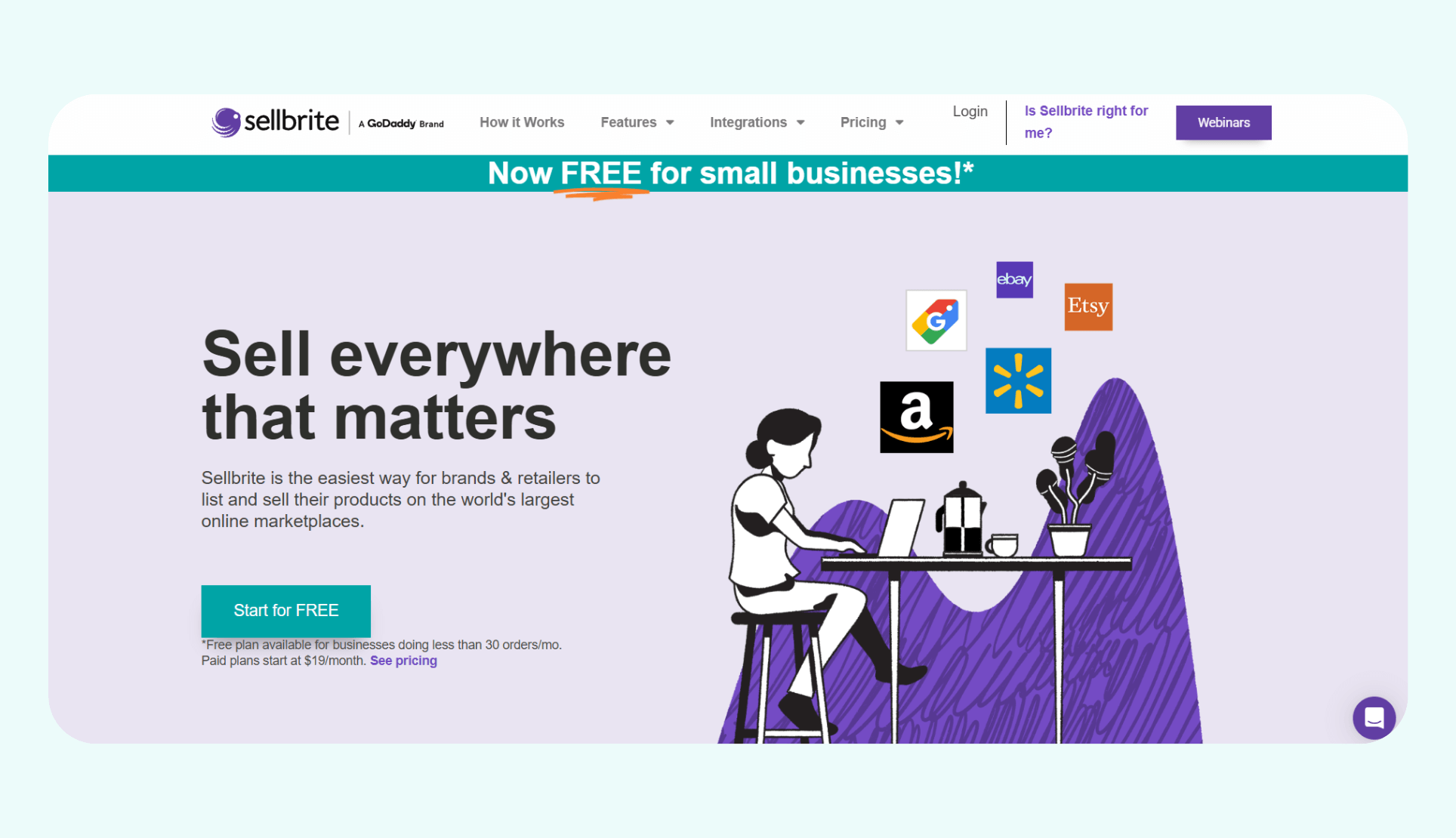
What it does: Sellbrite centralizes multichannel selling by enabling businesses to list products, inventory updates, and manage orders across Amazon, BigCommerce, eBay, Etsy, Google Shopping, Newegg, Sears, Shopify, Shopify Plus, Wallmart, and WooCommerce.
Who it's for: The platform appeals to e-commerce businesses, dropshippers, and established retailers managing substantial inventory across multiple online marketplaces.
In testing, Sellbrite's inventory uploading stood out by automatically adjusting stock across my Etsy and Newegg accounts. When an item sells on Etsy, Sellbrite removes it from Newegg within seconds.
Key features
- Multi-channel listing management: Sellbrite enables bulk product uploads and listing creation across major marketplaces like Amazon, eBay, Walmart, Etsy, Shopify, and BigCommerce.
- Amazon FBA integration and multichannel fulfillment: The tool imports Amazon FBA inventory to sell across other marketplaces and routes non-Amazon orders to FBA when beneficial.
- Business intelligence and reporting dashboard: Sellers get access to analytics showing sales performance, inventory turnover, and revenue trends across all connected marketplaces from a centralized dashboard.
Pros
- Marketplace integrations and easy setup: Users report quick setup processes and minimal learning curves compared to building separate workflows for each marketplace. I can vouch, as I connected two of my retail marketplaces in just a few seconds.
- Outstanding customer service and support: Sellbrite consistently receives praise for responsive, knowledgeable customer service, with users reporting direct access to company leadership for problem-solving.
Cons
- Higher pricing than other crosslisting tools: If you’re listing over 100 items monthly, you’ll need to go with the higher-priced tier. The fulfilled by Amazon feature also costs extra.
Pricing: Plans start at $29/month (PRO 100), but if you add FBA for $19/month, the starting cost is $48/month.
Bottom line
Sellbrite works best for established multichannel sellers and drop shippers. Pricing may deter smaller sellers, but businesses with large multichannel inventory will see Sellbrite's reliability and integrations as a worthwhile investment.
3. SellerChamp: Best for bulk product uploads and automation
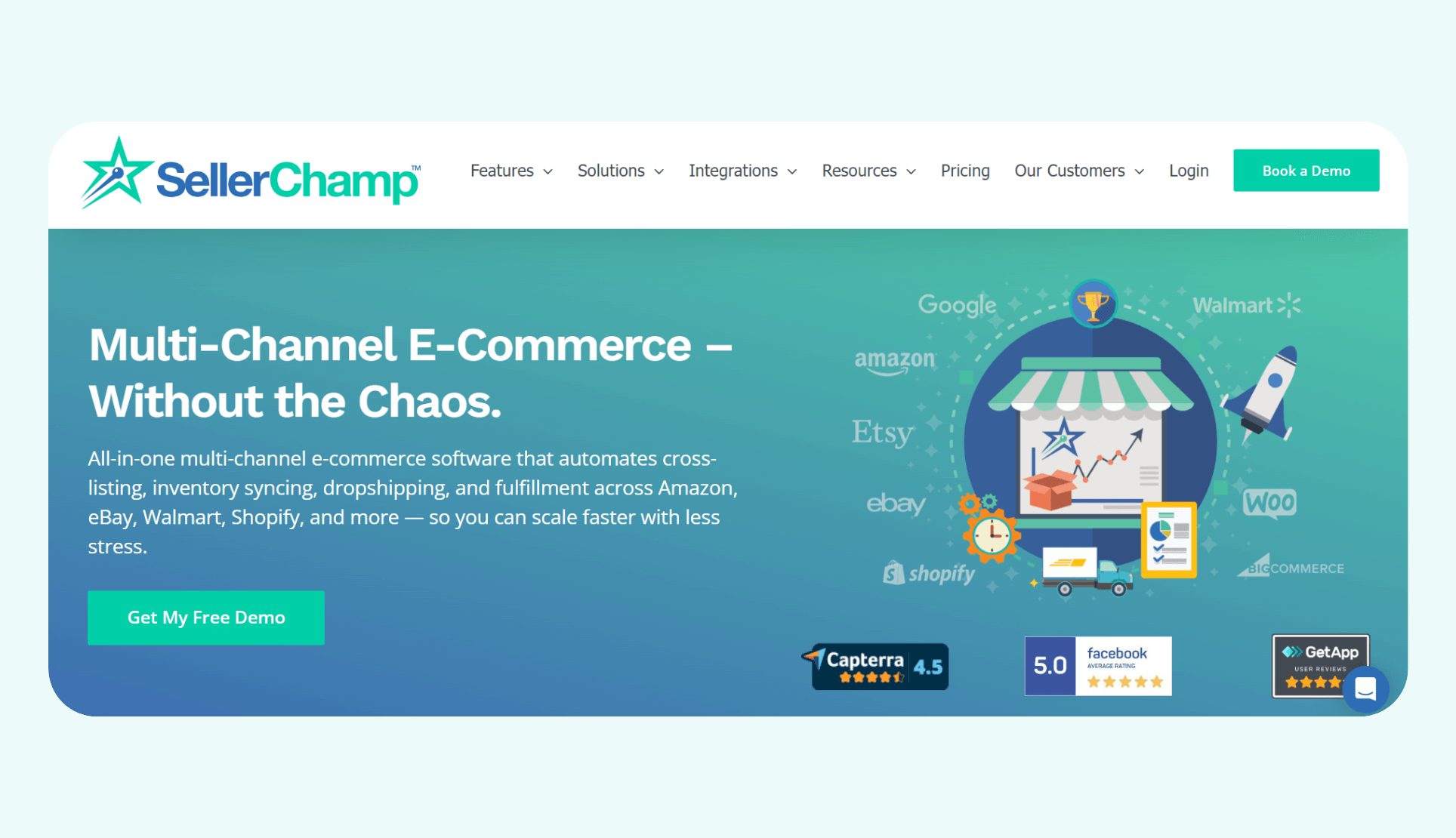
What it does: SellerChamp automates bulk listing and order fulfillment across marketplaces like Amazon, eBay, Walmart, and Shopify with AI data generation and workflow automation.
Who it's for: High-volume sellers, retailers, and e-commerce companies managing thousands of SKUs across marketplaces need enterprise-level automation to scale efficiently without data entry bottlenecks.
During the testing demo, I watched SellerChamp’s team bulk list dozens of products directly from a CSV, a capability that many crosslisting tools don’t provide.
Key features
- Bulk listing and product data automation: SellerChamp lets users list thousands of products at once across marketplaces, with barcode scanning, CSV uploads, or direct data feeds.
- Automated repricing and competitive intelligence: The tool includes Intelligent Repricing, a feature that monitors competitor pricing, market conditions, and sales to adjust prices for profitability and buy box wins.
- AI listing optimization and mobile management: SellerChamp's QuickSnap app lets users photograph products, create bundles, and instantly generate optimized listings with AI. The system creates marketplace-specific descriptions, adds relevant keywords, and customizes product data for each channel.
Pros
- Powerful bulk listing capabilities for high-volume operations: SellerChamp processes 10,000+ product listings simultaneously through multiple input methods, setting it apart from competitors with smaller catalog capacity.
- Large automation ecosystem with deep marketplace integration: The platform provides end-to-end automation for listing creation, inventory management, and fulfillment across all major marketplaces. Users praise the platform for its quality software.
Cons
- High pricing: SellerChamp only offers custom pricing, which can start at around $199/month. These high prices can be prohibitive for smaller sellers.
Pricing: Some third-party sites place the price range between $199 and $2,000 per month. However, SellerChamp doesn’t publish pricing; you’ll need to contact the sales team for a quote.
Bottom line
SellerChamp helps high-volume e-commerce and retail sellers with enterprise automation and bulk listing features unmatched by smaller tools. The platform delivers broad features and responsive support. However, reselling businesses should choose cheaper tools that integrate with reselling marketplaces, as SellerChamp is for retail and e-commerce sellers.
4. Crosslist: Best for quick crosslisting across marketplaces
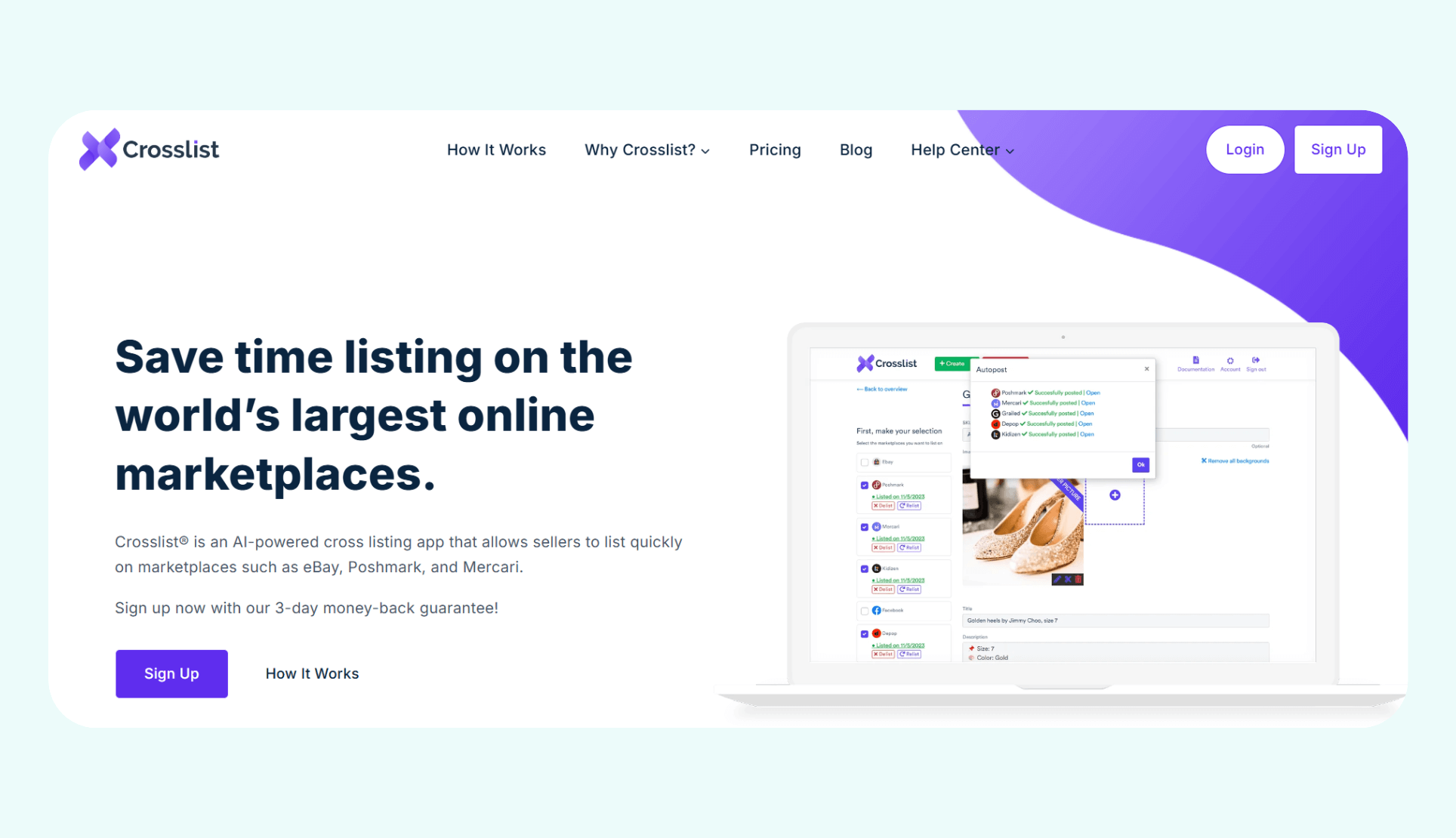
What it does: Crosslist helps resellers post items across 9 different marketplaces simultaneously with bulk listing and inventory syncing capabilities.
Who it's for: Volume sellers managing large inventory across platforms who need speed over advanced features.
When I tested Crosslist's “one-click integrations” and found the bulk upload feature genuinely saves hours when you're moving dozens of items. However, the automation features feel more like scheduled posting than true AI-powered optimization.
Key features
- One-click marketplace integrations: Connect eBay, Poshmark, Mercari, Depop, Facebook Marketplace, and Etsy accounts through OAuth authentication. Post to all platforms simultaneously with pre-filled templates that adapt to each marketplace's requirements and formatting rules.
- Bulk listing support with CSV imports: Upload hundreds of items via spreadsheet import, complete with photos, descriptions, and pricing. The system matches your data to marketplace fields and handles category mapping across different platform structures.
- Image editing tools: Improve product photos with brightness adjustment, background removal, and watermark application. The editor includes templates for consistent branding, but the suite doesn’t offer as many editing features as other tools.
Pros
- Reliable background posting: Unlike Chrome extensions that require constant browser activity, Crosslist's cloud-based system posts your items even when your computer is off.
- Strong marketplace coverage: The platform supports 9 major resale sites and regularly adds new integrations. The API connections feel stable, and I rarely experienced failed posts or sync issues during my testing period with various marketplace combinations.
Cons
- Limited AI assistance compared to competitors: Although Crosslist handles posting mechanics well, auto-delisting is based on manually marking items as sold, and you need to pay extra for its AI add-on if you want to auto-generate listing titles and details.
Pricing: Pricing starts at $29.99/month, but you’ll need to pay an extra $4.99 for AI features.
Bottom line
Crosslist excels at the mechanics of crosslisting but lacks the AI-powered intelligence that modern resellers need. It's solid for experienced sellers who already know how to write listings and just want faster posting, but beginners or those seeking smarter automation should consider Nifty instead.
5. Vendoo: Best budget-friendly option for beginner resellers

What it does: Vendoo provides crosslisting, inventory management, and limited automations across 11 marketplaces.
Who it's for: New resellers and casual sellers who want affordable crosslisting without premium features or complex automation.
I tested Vendoo's bulk import feature and found it requires manual click-to-confirm matching despite claims of automation. The photo background removal tool worked well, but the overall photo-editing suite felt bland.
Key features
- Crosslisting support across 11 platforms: Post items across eBay, Poshmark, Facebook Marketplace, Mercari, Etsy, Depop, Shopify, Whatnot, Vinted, Grailed, Vestiaire Collective from a single dashboard.
- Photoroom background removal integration: Clean up product photos with background removal, but it doesn’t offer saturation adjustment or filters.
- Bulk import and listing management: Import existing inventory from connected marketplaces, though the process involves manual confirmation for each matched item.
Pros
- Affordable entry point for new sellers: Starting at $8.99 monthly, Vendoo offers a budget-friendly crosslisting option, but this plan only allows for 25 listings. The most popular plan goes for $69.99/month, offering unlimited crosslisting items.
- Expansive marketplace coverage: Vendoo supports more platforms than most competitors, including niche sites like Whatnot and Grailed. But automations like offer sending and delisting only work on a limited number of marketplaces.
Cons
- Unreliable auto-delisting: Users report auto-delisting failures and slow sale detection, leading to cancellations and double-selling.
Pricing: Vendoo pricing starts at $8.99/month, but most users go for the $69.99/month version.
Bottom line
Vendoo works for beginner sellers who need a basic crosslisting tool, but folks with over 100 products will want to try a platform that has more automated features and bulk listing tools.
6. Nembol: Best for syncing listings across Shopify and marketplaces
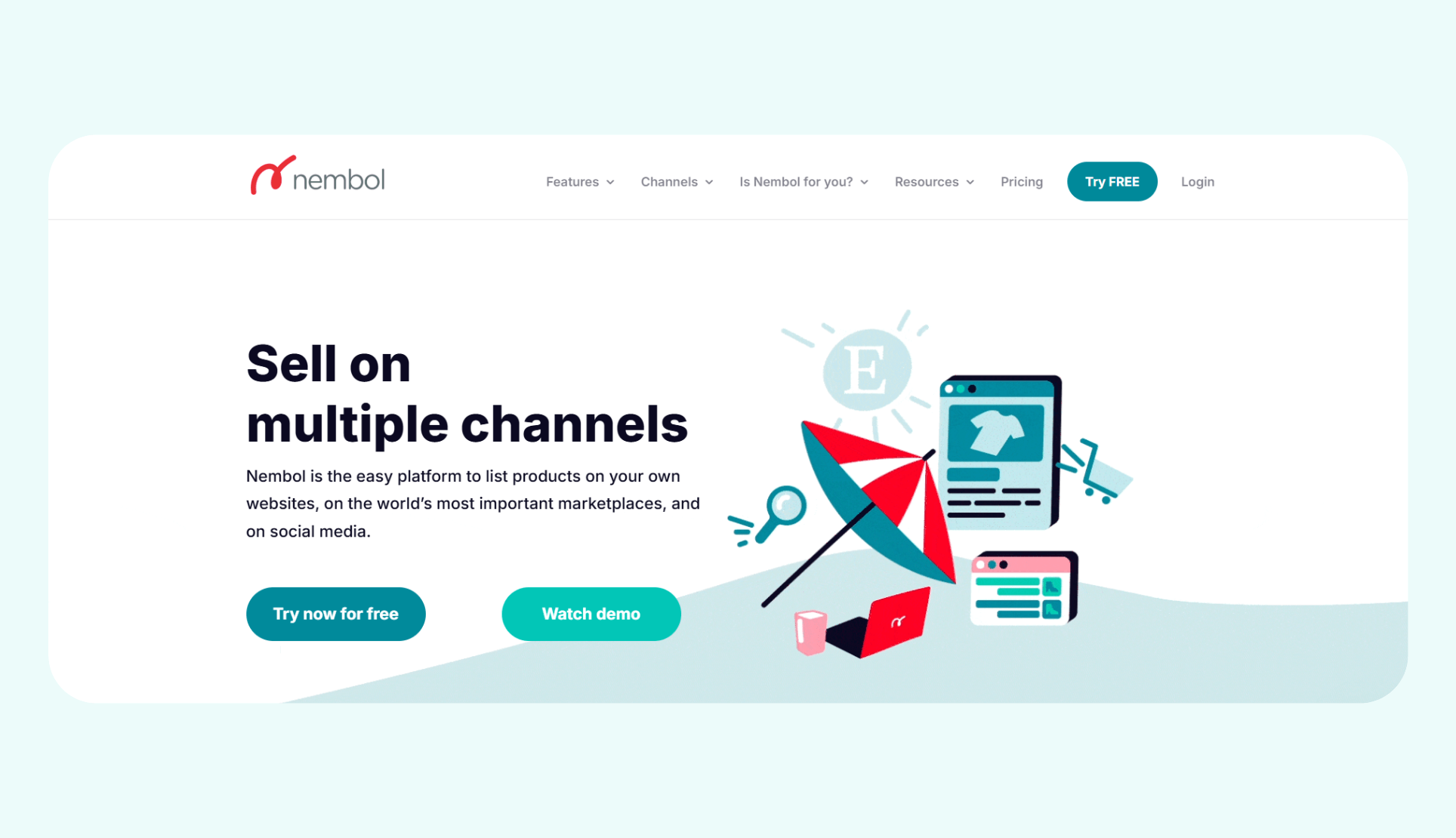
What it does: Nembol uploads inventory and orders between Shopify stores and major marketplaces like Amazon, eBay, and Etsy with real-time updates.
Who it's for: E-commerce retailers, dropshippers, and store owners managing inventory across their websites and multiple selling channels.
During testing, I generated a Shopify storefront from my Amazon listings. The entire process took around 30 minutes, though Nembol notes the actual website generation happens in seconds once products are imported.
Key features
- Supports major e-commerce platforms: Upload listings from Amazon, eBay, Shopify, Etsy, WooCommerce, TikTok Shop, and PrestaShop. However, users have reported that the system creates double listings across platforms.
- Order consolidation and fulfillment automation: The system aggregates orders from all sales channels into one dashboard for streamlined processing and shipping. It routes orders to Shopify’s backend for centralized fulfillment management and automatically updates inventory across platforms when orders are processed.
- Website generation for marketplace sellers: The system creates Shopify storefronts automatically using your marketplace listings and product data. It builds branded websites with checkout, product pages, and SEO tools without needing web design expertise.
Pros
- Shopify integration feels native to the platform: Nembol integrates smoothly with Shopify’s admin, so it works like a built-in feature instead of external software. This integration removes the learning curve and workflow disruption from third-party tools.
- Inventory management prevents overselling: Real-time stock updates across all channels prevent double-selling issues for multichannel sellers. The system manages partial shipments and backorders and keeps availability data accurate.
Cons
- Not ideal for resellers: If you’re a reseller listing on sites like Poshmark, Mercari, and Depop, you won’t be able to upload your products to Nembol, as it’s not compatible with these reselling marketplaces.
- Unreliable listing: Multiple customers on Trustpilot and Shopify App Store have documented cases where hundreds of duplicate listings were automatically generated or unlisted, resulting in significant losses, confusion, and stress.
Pricing: Nembol plans start at $39/month, allowing you to upload up to 500 products.
Bottom line
Nembol excels for e-commerce merchants and retailers. But resellers should explore other tools that connect to reseller-friendly sites.
7. List Perfectly: Best for community-driven crosslisting sellers
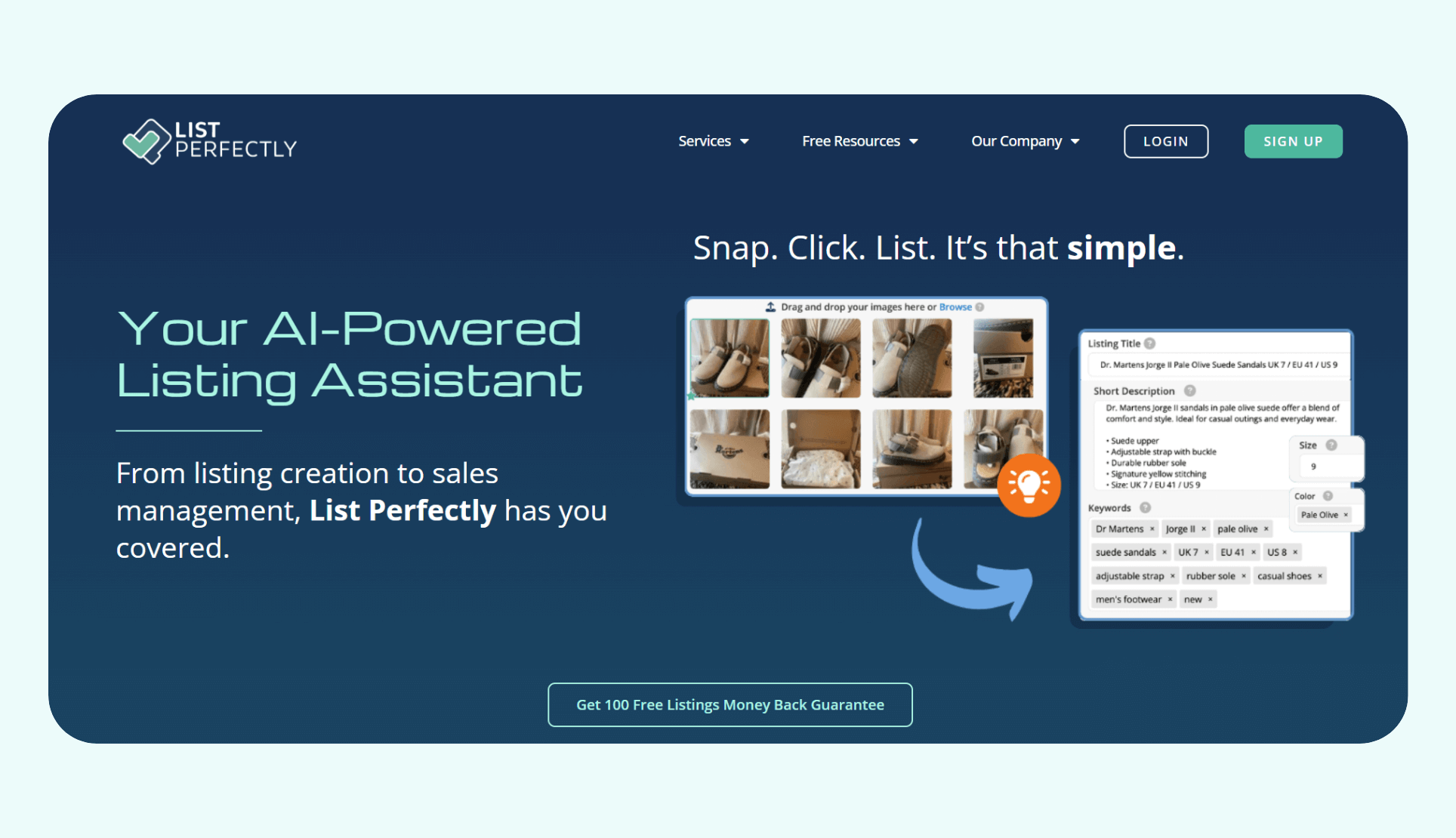
What it does: List Perfectly provides crosslisting tools combined with live educational events, seller communities, and mentorship programs for resellers.
Who it's for: Social sellers and community-minded resellers who value learning opportunities and peer support alongside their crosslisting needs.
I tested List Perfectly's crossposting features, and could crosslist 1 item every 45 seconds on average. But I had to manually select each item at a time for crossposting. Notably, actual posting times will vary depending on listing details, network speed, and user familiarity with the workflow.
Key features
- Crosslist to 11 marketplaces: List Perfectly supports Grailed, Depop, eBay, Etsy, Mercari, Facebook Marketplace, Poshmark, Vestiaire Collective, and more.
- Pro Plus mobile access: The List Perfectly app is available on iOS and Android, but only for sellers on the highest-tier plan.
- AI listing generation: Depending on the subscription, sellers can generate 25 to 1,000 AI-written titles and descriptions each month.
Pros
- Active, supportive community: The tool builds seller connections through Listing Parties, where sellers share sourcing tips, updates, and problem-solving strategies.
- Unlimited crossposting: List Perfectly lets you crosspost unlimited listings across all supported platforms. This benefits high-volume sellers and removes worries about quotas or overage fees. However, crossposting requires manual selection of each item individually rather than automated bulk processing.
Cons
- Platform feels dated and has a learning curve: The interface looks outdated and less polished than modern crosslisting tools. Some users report that the dashboard takes time to learn.
Pricing: List Perfectly pricing starts at $29/month.
Bottom line
List Perfectly suits sellers who value community learning and peer support. Sellers who want a more productive experience may prefer Nifty’s AI tools over List Perfectly’s community focus and dated interface.
8. Linnworks: Best for enterprise-level inventory and order management
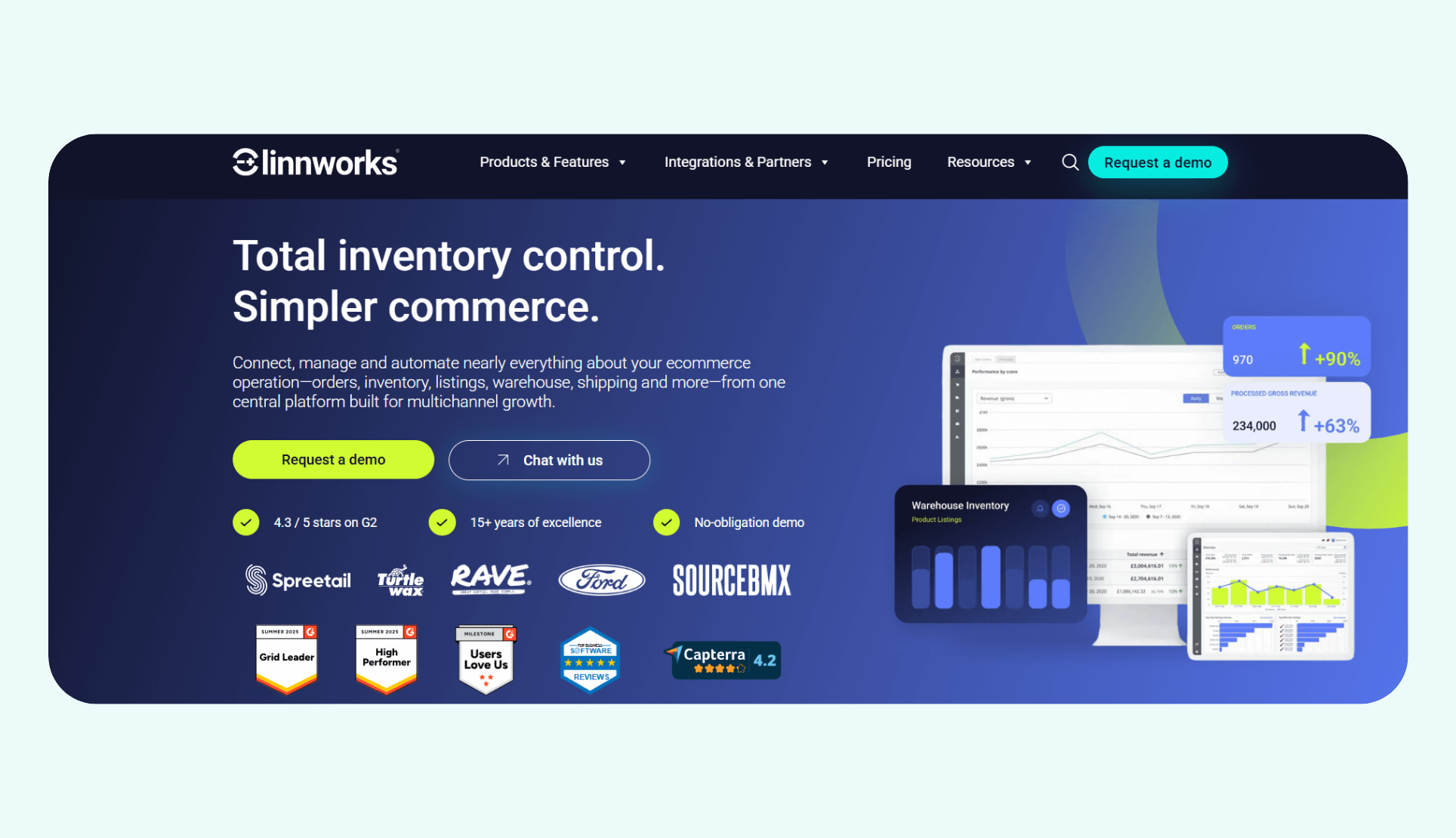
What it does: Linnworks provides inventory management, order processing, and warehouse automation for large-scale e-commerce operations across multiple sales channels.
Who it's for: Enterprise retailers, wholesale distributors, and high-volume e-commerce businesses managing complex inventory across warehouses and dozens of sales channels.
The demo showed a powerful warehouse management suite that companies can use for end-to-end fulfillment.
Key features
- Multi-warehouse inventory management with real-time tracking: The system manages stock across locations with automated reorders, but inter-warehouse transfers must be configured manually. It tracks inventory movement, applies allocation rules, and keeps availability accurate across all channels.
- Advanced order processing and fulfillment automation: The system automates routing, pick lists, and carrier selection with custom rules. It integrates with WMS, barcode scanners, and packaging equipment to simplify fulfillment.
- Marketplace and channel integration: The system connects to 100+ channels like Amazon, eBay, Shopify, and Walmart. It manages channel rules, fee calculations, and compliance while keeping inventory and pricing centralized.
Pros
- Scalable for large inventory volumes: Linnworks manages millions of SKUs across 100+ sales channels without slowing down. It supports complex variations, bundles, and workflows, so it suits major retailers and distributors.
- Automation reduces errors: Business rules automate routing, inventory allocation, and fulfillment by location, rates, and criteria. This automation cuts errors in high-volume operations and keeps service consistent.
Cons
- Enterprise pricing puts it out of reach for most sellers: Monthly costs start in the hundreds and scale to thousands depending on volume and features. The pricing model assumes enterprise revenue that most resellers and small businesses can’t sustain.
Pricing: Linnworks doesn’t publish pricing, so reach out to the team and schedule a demo for more information.
Bottom line
Linnworks excels for major retailers and distributors managing complex operations with multi-location warehouses, but it's completely inappropriate for typical resellers.
9. Shopify Marketplace Connect: Best for brands centralizing sales in Shopify
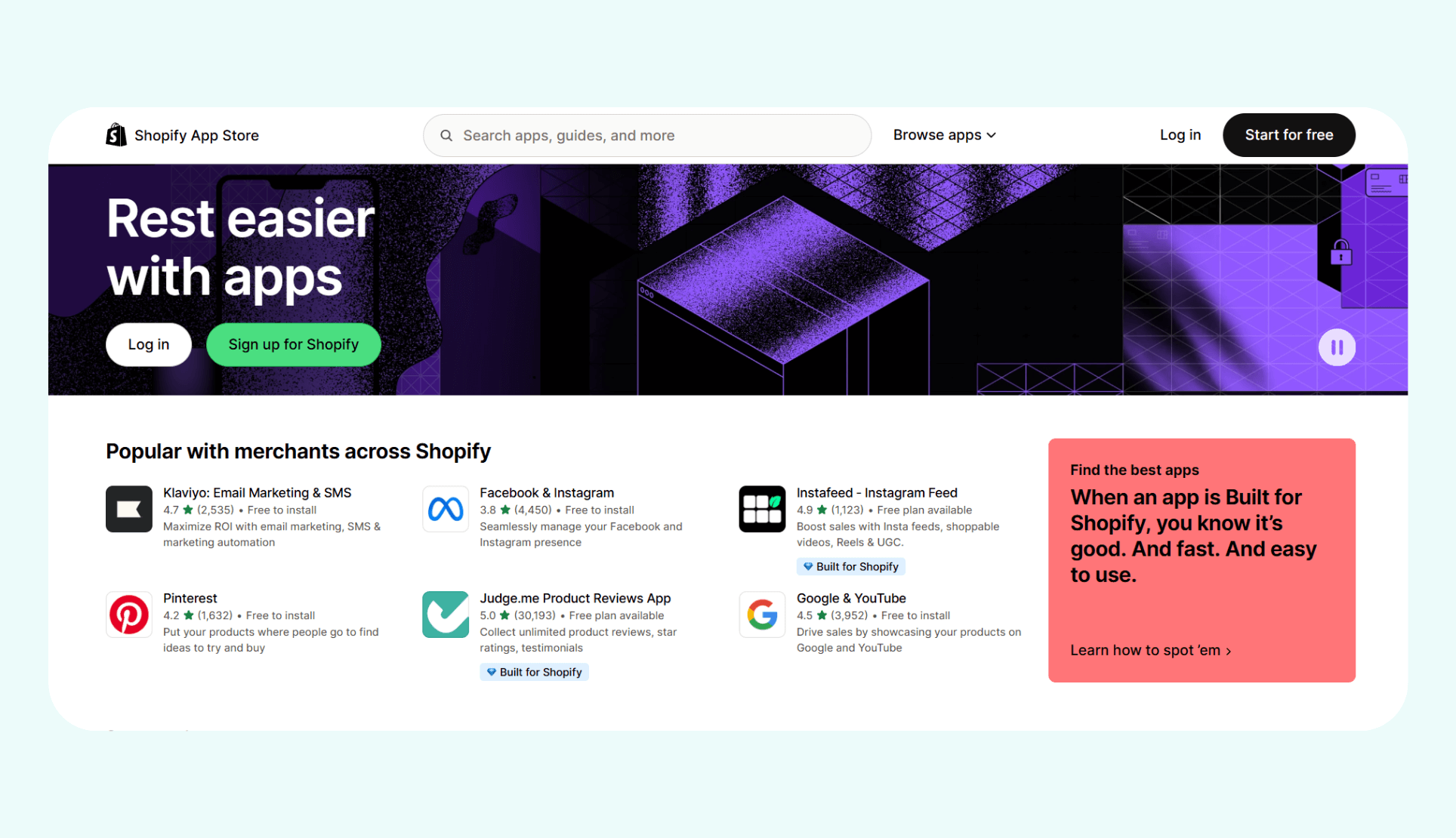
What it does: Shopify’s marketplace connect apps (formerly Codisto) connect your store to Amazon, eBay, Walmart, and more with synced inventory.
Who it’s for: Established brands using Shopify as their main platform that want a broader marketplace reach.
I used Shopify’s Amazon integration to pull product variants and pricing rules. The inventory sync worked natively within Shopify.
Key features
- Native Shopify integration: The system connects marketplaces through Shopify’s admin and maintains catalogs, pricing, and inventory in one workflow. It treats marketplace channels as extensions of your Shopify store, not separate platforms.
- Real-time inventory synchronization across all channels: The system updates stock levels after each sale to prevent overselling and keeps availability accurate. It handles variants, pre-defined bundles, and location-based stock management.
- Centralized order management: The system processes marketplace and website orders in Shopify’s interface with unified data and tracking. It consolidates all sales channels into one workflow.
Pros
- Brand consistency across all sales channels: Shopify keeps branding, product presentation, and customer experience consistent across websites and marketplaces. This consistency strengthens brand recognition and trust compared to fragmented platforms.
- Enterprise-grade reliability with Shopify's infrastructure: The platform offers scalability, uptime guarantees, and support without risky third-party integrations. Shopify updates and maintains native connections as the platform evolves.
Cons
- Requires existing Shopify subscription with added base costs: Marketplace integrations need an active Shopify store starting at $29/month plus app fees. This raises costs for sellers who don’t need full websites or mainly sell through marketplaces.
Pricing: Shopify pricing starts at $29/month, but app prices vary depending on which services you integrate.
Bottom line
Shopify + Marketplaces suits established brands expanding reach, but its e-commerce focus and pricing don’t fit most resellers.
How I tested these multichannel listing software tools
I tested these multichannel listing tools in real reselling scenarios over several weeks.
I evaluated each platform on inventory as I measured listing speed, sync accuracy, and interface under seller workloads. Here’s what I tested:
- Listing creation speed: Selling productively depends on how fast sellers create and distribute listings across platforms. I timed each listing from photo upload to publication, measuring manual speed and AI content quality. Tools that cut listing time under 3 minutes per item while staying accurate scored highest.
- Inventory updates reliability: Accurate tracking prevents costly mistakes and wasted customer service time. I tested the speed with purchases and measured how fast stock updated across marketplaces. The best tools could update inventory within 2 to 3 minutes of each sale.
- Platform coverage quality: I tested each tool’s connections on major platforms like Amazon, eBay, and reseller sites like Depop (when applicable). The best tools integrated with 5 major marketplaces.
Additional factors I considered:
- Pricing transparency: Many listing tools advertise low prices but add fees for bulk actions or marketplace connections. I calculated monthly costs with add-ons to determine the real value. Tools with clear pricing scored higher than those with hidden fees.
- Learning curve and support quality: Success depends on how quickly sellers get productive and access help. I evaluated onboarding, documentation, and support. Platforms with an intuitive design and strong support scored the highest.
Which software should you choose?
The right software depends on your business model, marketplace priorities, and growth stage. For example, vintage resellers on Poshmark and Depop need different software than an Amazon FBA dropshipper managing thousands of SKUs.
Choose Nifty if you …
- Sell across reseller and e-commerce marketplaces: Nifty works best across reseller sites Poshmark, Mercari, or Depop. It also covers e-commerce sites like eBay and Etsy.
- Want automation that runs without supervision: Nifty’s cloud system runs sharing, relisting, and offer campaigns 24/7 without open tabs or powered computers.
- Need mobile-friendly tools: We built Nifty to work across phones, tablets, and desktops. This capability allows resellers to access Nifty while away from their desktops.
Choose Sellbrite if you …
- You’re an established e-commerce business: Sellbrite excels for folks with consistent inventory across traditional marketplaces like Amazon and eBay. It works best for sellers managing catalogs rather than one-off reseller items.
- You need Amazon FBA integration: By routing non-Amazon orders to FBA, Sellbrite benefits sellers with steady inventory who want to use Amazon’s logistics across all channels.
Avoid Vendoo if …
- You need reliable automation: Vendoo’s auto-delisting often fails, causing double-selling that hurts reputation and wastes customer service time. The click-to-confirm bulk import undermines automation and is slower than listing manually on platforms.
- You want transparent pricing: Essential features like bulk tools and analytics add fees that inflate the advertised price. Sellers often find that real monthly costs exceed premium tools after adding needed features.
Avoid Linnworks if …
- You’re a reseller or small business: The tool targets distributors and manufacturers with complex warehouses, multi-location inventory, and enterprise budgets.
- You sell unique items like handicrafts or vintage: Linnworks is built for retail models with predictable inventory, SKUs, and wholesale patterns.
My final verdict
Nifty is the best choice for resellers scaling across marketplaces without losing quality or control. AI-powered listings, cloud automation, and broad marketplace coverage solve daily reseller challenges. In testing, Nifty had the fastest listings, most reliable sync, and strongest reseller features.
Get started with Nifty
Need multichannel listing software for reselling on sites like Depop, Mercari, and Poshmark? Go with Nifty. Its AI capabilities simplify listing and bulk editing, allowing you to focus more on sourcing and building relationships with clients. Here’s why you should choose Nifty:
- Turn photos into listings: Nifty’s AI converts a single image into a polished listing, complete with SEO-friendly titles, detailed descriptions, trending hashtags, and pre-filled fields.
- List on five marketplaces instantly: Publish to Poshmark, eBay, Mercari, Depop, and Etsy at once, with auto-delisting to prevent double sales. (More marketplaces on the way!)
- Automatic delisting? Handled: When you make a sale, Nifty pulls that item from every marketplace. Say goodbye to double-selling disasters and “sorry, it’s already gone” apology messages.
- Bulk tools = no busywork: Share and relist daily without lifting a finger. Update or discount dozens of items at once. You can even schedule drafts to go live while you sleep.
- Smarter sales insights: View sales, fees, bestsellers, and slow movers in one dashboard to spot trends and plan growth.
Get started with a 7-day free trial and see why we ranked Nifty as the best overall multichannel listing software.
FAQs
1. What is the best multichannel listing software for small sellers?
Nifty is the best multichannel listing software for all sellers, combining AI listings, affordable pricing, and broad coverage. It supports Poshmark, Mercari, Depop, Etsy, and eBay while keeping costs reasonable and scalable.
2. Which platforms integrate with multichannel listing software?
eBay, Amazon, Etsy, and Shopify integrate with multichannel listing. Nifty integrates with reseller-focused platforms, including Poshmark, Mercari, Depop, eBay, and Etsy, whereas enterprise tools like Sellbrite focus on traditional e-commerce channels and may lack connections to specialized reselling marketplaces.
3. Can I switch between listing tools easily?
Yes, you can switch between listing tools easily, though the process requires exporting your inventory data and reconnecting marketplace accounts to the new platform. Most tools support CSV exports and imports, but sellers must reconfigure automation, pricing rules, and platform preferences. The transition usually takes a few hours to set up and verify inventory sync.



.jpg)

.jpg)